As a bearded dragon owner, you might be wondering whether your pet can indulge in some fruit now and then. While a balanced diet for a bearded dragon includes mostly vegetables and insects, introducing some fruit as a treat can be a tasty and beneficial addition to their diet. But can bearded dragons eat apples? In this blog post, we’ll explore the benefits and risks of feeding apples to bearded dragons.
A Bearded Dragon As a Pet
Have you always wanted a pet that’s easy to take care of, friendly, and low-maintenance? Look no further than a bearded dragon! These reptiles make excellent pets for anyone, and are perfect for beginners. Not only are they fun and cute, but they also have unique behaviors and personalities that make them truly one of a kind. Let’s learn about their habitat, behavior, diet, and more.
Habitat
Beardies are natives of the Australian desert, meaning that they need a warm and dry environment to thrive. You’ll need a tank that’s at least 40 gallons, but the bigger, the better. Inside this tank, you’ll need a heat source such as a basking lamp, as well as a UVB light, which helps your pet’s bones to grow strong.
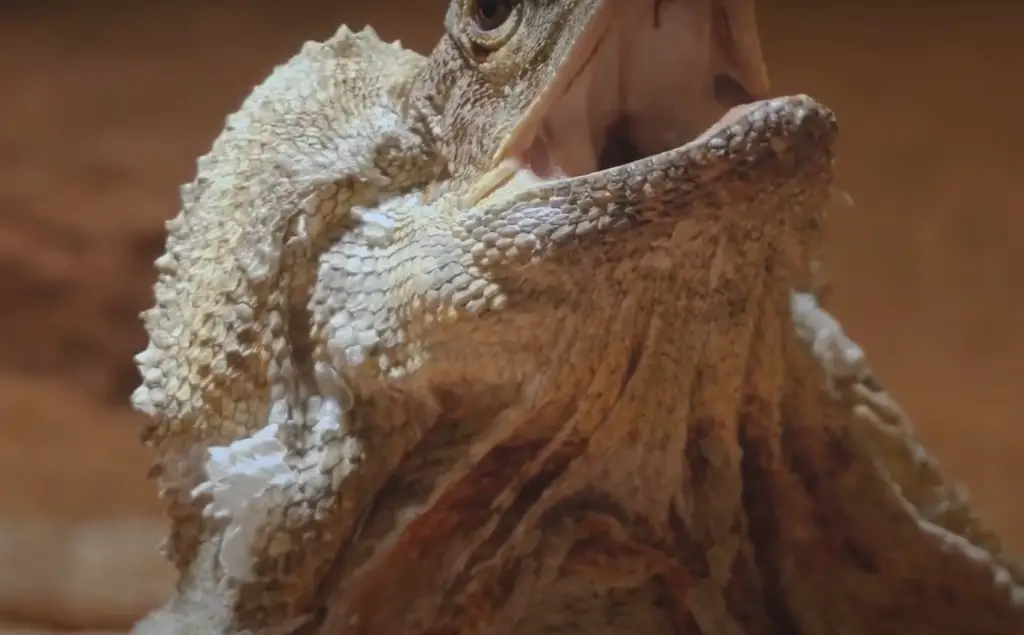
On the bottom of the tank, you’ll need a substrate such as reptile carpet or paper, as well as places for your bearded dragon to hide, climb, and bask.
Behavior
These reptiles have a fun and quirky personality that make them adored by many. Not only are they docile and laid-back, but they also have several behaviors that make them stand out. These reptiles are known for their arm-waving behavior, which is a sign of submission or greeting. They also enjoy being out of their tanks, and can be trained to walk on a leash and even play games.
Diet
The main components of beardies’ diet include vegetables such as collard greens and carrots, as well as protein such as crickets and mealworms. Providing your reptile pet with a balanced diet is important, as it can affect their health and growth. Make sure to add a calcium supplement to their food, which is important for their bone health.
Health
Beardies are generally healthy pets, but like any animal, they can get sick or injured. Signs of a sick reptile include lethargy, loss of appetite, diarrhea, or abnormal behavior. If you notice any of these signs, seek veterinary care immediately. Bearded dragons can also be injured by burns from their heat source, so it’s important to make sure their basking spot is not too hot.
In conclusion, bearded dragons can make great pets for anyone looking for a low-maintenance, friendly, and unique companion. They are easy to care for, have fun behaviors, and are fascinating creatures to observe. If you’re interested in getting a bearded dragon, make sure to do your research and provide them with the proper habitat, diet, and care. With love and attention, your bearded dragon will provide you with years of happiness and companionship.
A Bearded Dragon’s Diet: All You Need to Know
Are you thinking of getting a beardie as a pet? Or maybe you already have one and want to give it the best diet for a long and healthy life. Well, you’re in the right place! In this part of our blog post, we’ll cover everything you need to know to ensure your bearded dragon gets all the nutrients it requires for optimal health.
Protein
Bearded dragons are omnivores, meaning they require a mix of plant- and animal-based protein. In the natural habitat of these reptiles, they consume insects, small animals, and vegetables. As a pet owner, you can offer your dragon a combination of some insects, such as crickets or mealworms, along with leafy greens and vegetables such as kale and carrots. A general guideline is to aim for a diet that consists of 60% insects and 40% veggies. However, be cautious not to overfeed on insects, as it can cause obesity.
Calcium
Strong bones are crucial for bearded dragons, and they need a normal amount of calcium to maintain them. You can fulfill this requirement through their diet and by providing them with sufficient UV lighting. Dust insects with a calcium supplement before feeding them to your dragon, or add it to their salad.
Water
As any other pet, these reptiles need access to fresh, clean water all the time. They usually prefer drinking from shallow dishes rather than deep water bowls. However, they also obtain moisture through their skin, so it’s vital to mist their enclosure with water regularly. This helps prevent dehydration, skin problems, and some other health issues.
Variety
Bearded dragons can become bored with the same meals, similar to us. Therefore, it is recommended to offer a variety of insects and veggies to keep their taste buds satisfied. Some excellent insect variants include mealworms, crickets, and waxworms.
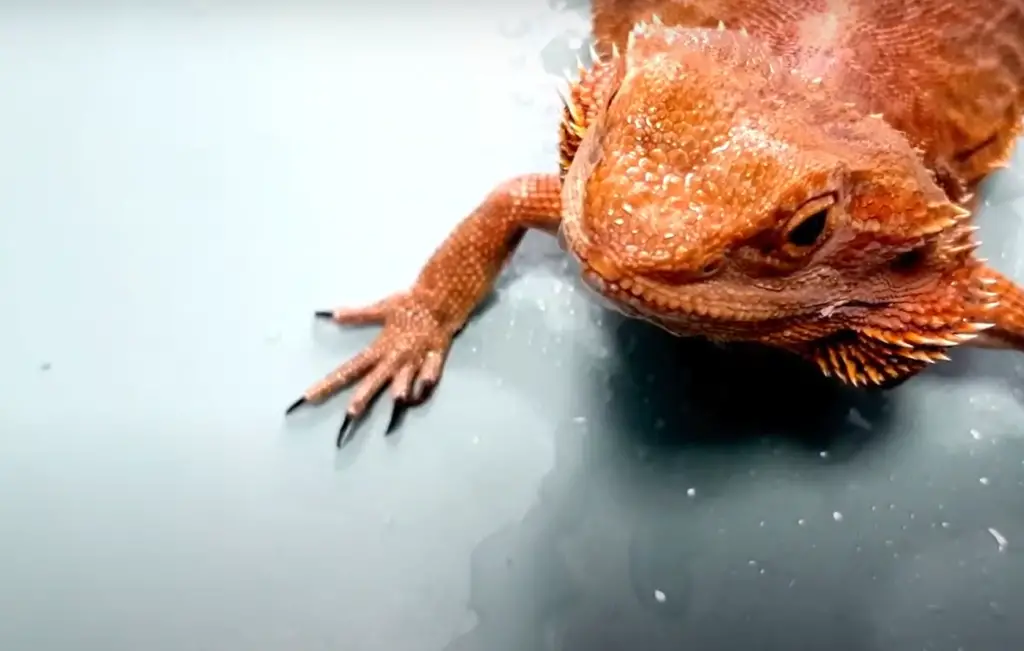
As for veggies, try incorporating collard greens, dandelion greens, butternut squash, bell peppers, and blueberries. Offering a variety not only keeps your pet interested but also ensures they receive a well-rounded balance of nutrients.
The Right Portions
These reptiles have specific dietary requirements based on their size, age, and activity level. For instance, baby dragons need more protein and calcium compared to adults. It is essential to research and understand your pet’s specific requirements. Feeding them the correct portions will prevent overeating and obesity, which can lead to future health problems.
Taking care of a bearded dragon may require some effort, but it is incredibly rewarding. By following these guidelines, you can ensure your pet’s health and well-being.
Nutrition Value of Fruit for Bearded Dragons
Fruit is a tasty and nutritious snack for humans, but did you know it’s also a vital part of your bearded dragon’s diet? Bearded dragons are omnivores, eating both plants and animals, and adding fruit to their meals provides essential vitamins and nutrients. In this part of our post, we’ll explore safe fruits for bearded dragons and the benefits they offer.
Apples
Besides being a common household fruit, apples are a fantastic treat for our scaly friends. They’re packed with immune-boosting vitamin C and muscle-aiding potassium. Apples also contain fiber to aid digestion. Remember to remove toxic apple seeds before feeding. [1]
Grapes
Another popular fruit, grapes are rich in antioxidants that protect against cell damage. They provide vitamin K for blood clotting and vitamin A for healthy vision. Bearded dragons can enjoy both red and green grapes. [1]
Berries
Strawberries, blueberries, raspberries, and blackberries can be given as a small treat. Berries are full of nutrient goodness, including vitamin C, fiber, and antioxidants. Avoid overfeeding due to higher sugar content.
Mango
This tropical fruit is not only delicious but also a great source of vitamin A for vision and healthy skin and claws in bearded dragons.
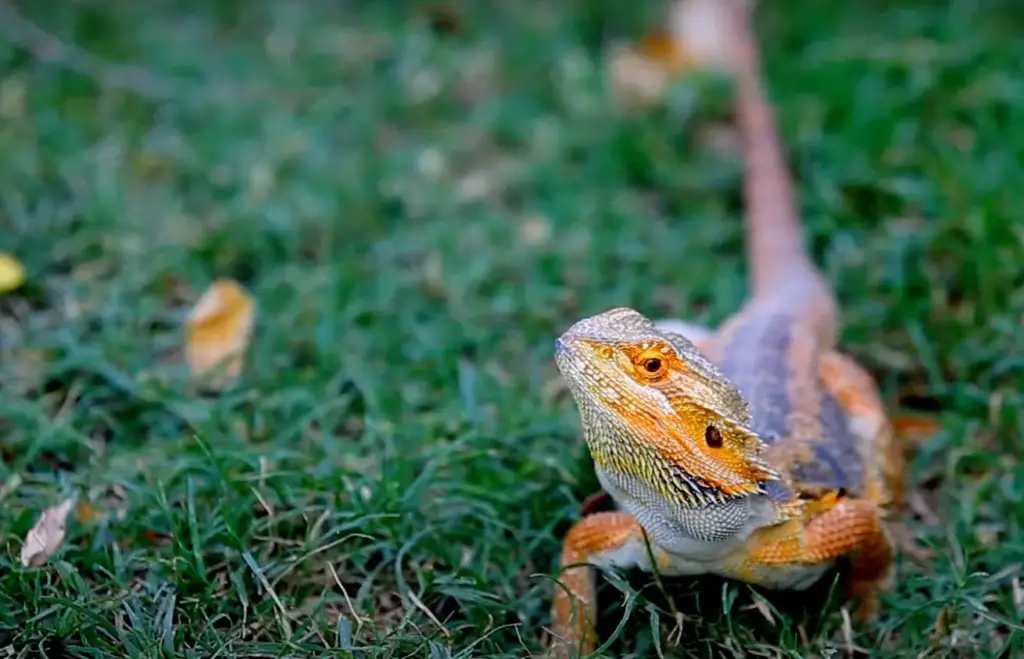
It’s high in fiber for regular bowel movements. Remove the pit and cut the flesh into small pieces when offering mango.
Papaya
Another tropical fruit, papaya is an excellent choice for bearded dragons due to its digestive enzymes. It provides vitamins A, E, K, and folate, along with aiding digestion, especially in cases of constipation. [1]
By incorporating fruit into your bearded dragon’s diet, you can provide a well-rounded and balanced meal plan. Remember to offer fruit in moderation and avoid those with high sugar content. As with any dietary changes, consult your veterinarian before modifying your bearded dragon’s diet. Happy feeding!
Benefits and Drawbacks of Feeding Apples to Your Bearded Dragon
Beardies are really popular pets in the modern world, and their diet is always a topic of conversation. Some owners want to know if it’s healthy for their dragon to eat fruits like apples. Apples are amazing fruits that are found around the world, and thus it’s feasible to wonder whether they’re safe for these reptiles. In this part of our blog post, we’ll explore the benefits and drawbacks of giving apples to bearded dragons.
Benefits of feeding apples to bearded dragons
One of the major benefits in this case is that these fruits are rich in vitamins. Apples are rich in Vitamin C and Vitamin A, which helps with bone development, immune system health, and healing after injury. In addition to vitamins, apples contain dietary fiber that helps regulate the digestive system of your reptile pet.
The fiber in the apple also helps to maintain the general health of your pet. Another advantage of feeding apples to your bearded dragon is that they help to hydrate the reptile. Beardies, like all animals, require plenty of water to stay well hydrated. Apples have a high content of water, making them ideal as a snack for your pet to nibble throughout the day. It will help to make sure that your reptile pet stays hydrated and healthy. [2]
Drawbacks of feeding apples to bearded dragons
One of the downsides of giving apples to your bearded dragon is their high sugar content. Apples contain a lot of fructose, which, in large amounts, may cause harm to your bearded dragon’s health. Too much sugar in their diet can lead to obesity and other health problems over time. Another disadvantage of feeding apples to your bearded dragon is that it may cause digestion issues. Apples are high in acid, which can cause your pet to experience indigestion, gas, and diarrhea. In addition, the skin of the apple can be tough to digest, which may cause blockages or constipation in your bearded dragon if it’s not chewed properly.
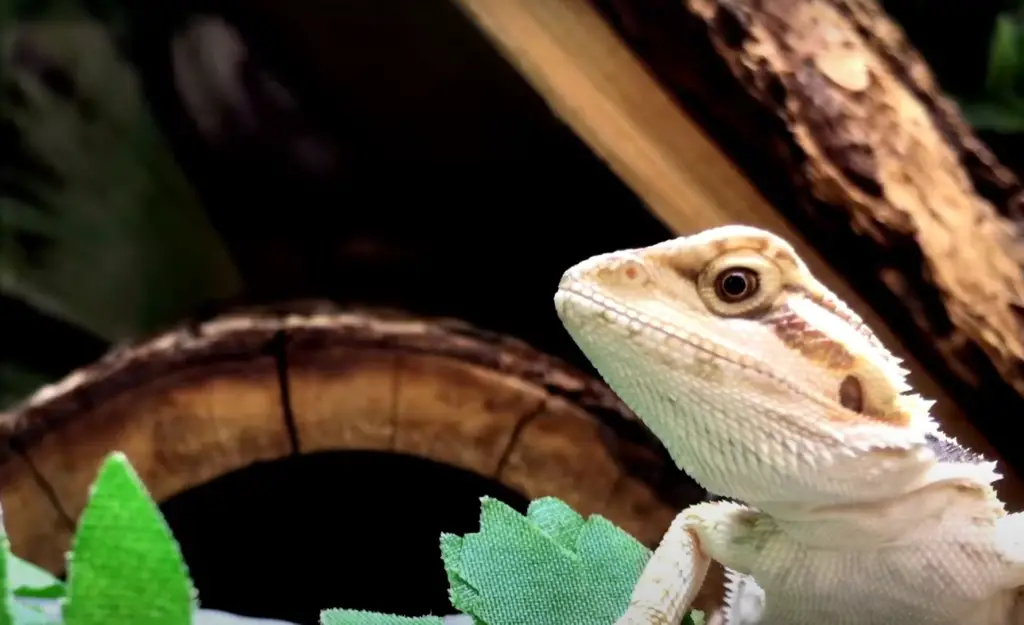
In conclusion, apples are not harmful to these reptiles when fed in moderation. They provide essential vitamins, minerals, and dietary fiber that are essential for maintaining overall health. However, excessive intake of apples can lead to health complications, such as obesity and digestion issues. It’s important to keep in mind that apples should only be given to bearded dragons as a treat in small quantities and diced appropriately. If you have any concerns about your bearded dragon’s diet, it’s always a good idea to consult with a veterinarian who specializes in reptiles.
Do Baby Bearded Dragons Eat Apples?
One of the most exciting things about owning a baby bearded dragon is watching them grow and develop. As a responsible pet owner, it is important to provide your pet with a balanced diet to ensure proper growth and development. Giving fruits and vegetables to your baby reptile pet is an important part of their diet, and apples are a popular choice. In this part of our blog post, we will look at why these fruits are useful for baby bearded dragons and how to properly feed them to your pet.
Apples are a great source of vitamins and minerals for these baby reptiles. They contain Vitamin C,and it helps the immune system to function properly, and Vitamin A, which is crucial for healthy eyes and skin.
When giving apples to your baby beardie, it is highly important to offer them in small quantities, as too much fruit can lead to diarrhea and other digestive issues. When feeding apples to your baby bearded dragon, it’s important to prepare them properly.
If you notice any changes in their behavior or health of your pet, such as loss of appetite or lethargy, it’s important to consult with your veterinarian right away. Feeding your baby bearded dragon a balanced diet is crucial for their health and happiness.
Feeding your baby bearded dragon apples in small quantities will give them highly important minerals and vitamins for their diet. Remember to properly prepare the apples, cut them into little pieces and remove all the seeds or core. As with any food you feed your pet, monitor their health and behavior closely to ensure they are getting the nutrients they need.
Are Apple Seeds Safe for Bearded Dragons?
Beardies are one of the most popular reptile pets in the world today, known for their docile temperaments, easy upkeep, and relatively low maintenance. As a responsible beardie owner, you should know that feeding your reptile pet a balanced diet is highly important to its general health. But can bearded dragons eat apple seeds safely? Are these seeds toxic, or are they okay in small quantities? Now we’ll dive deep into the specifics of whether these reptiles can safely eat apple seeds.
The first thing you need to know is that apple seeds contain small amounts of cyanide, which is a toxic chemical that can cause severe health problems in people and pets alike. However, the amount of cyanide contained in apple seeds is simply too small to cause any harm to your bearded dragon if they consume it in moderation. That being said, beardies are not supposed to eat apple seeds regularly, as it may cause health issues if not fed in moderation.
In general, it’s advised to avoid feeding apple seeds to your beardie in large amounts, as it can cause gastrointestinal issues, including constipation and diarrhea. One option for feeding your bearded dragon apple regularly is to cut slices of apples for them, and while cutting the apples, be sure to remove the seeds.
These reptiles will enjoy apples because they are great sources of fiber, minerals and vitamins that are good for their overall health. Apple slices make a great occasional fruit treat for your reptile pet in moderation without toxic effects. In situations where you don’t have the time to cut the slices, or if you run out of the sliced apple, you can buy commercially available apple baby foods, which come without seeds and artificial preservatives.
Feeding baby food, or other packaged food items meant for humans, to bearded dragons should be in moderation and under strict supervision. It’s also essential to note that feeding bearded dragons apple seeds from the commercially sold fruit cups or ready to eat items is strictly prohibited. These items come with artificial preservatives and high levels of added sugar that can cause many health issues that may be fatal to the beloved pet.
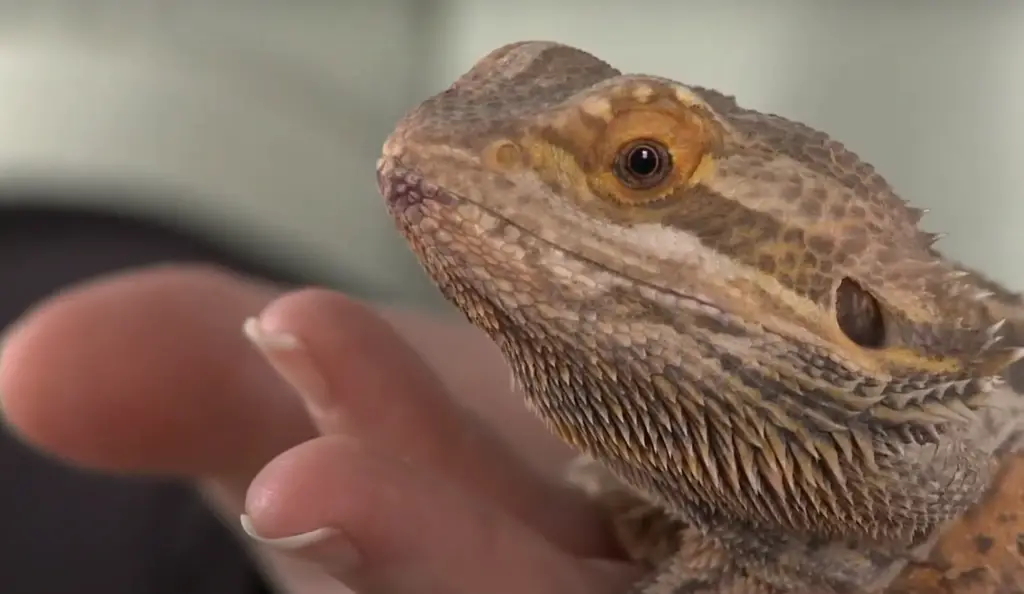
To sum up, these reptiles can eat apple seeds, but it should be done in moderation. Seeds contain small amounts of toxins that can cause issues for your bearded dragon’s health, such as constipation, diarrhea, or even death if ingested in large quantities. To avoid all this, it’s best to cut apple slices for your bearded dragon and avoid commercially sold apple seeds, baby foods, or packaged products.
A balanced diet which consists of fresh greens, insects, and infrequently offered fruits is essential for the well-being of your beloved reptile pet. So be mindful of what food you treat your beardie to ensure a long and happy life for your pet.
The Right Way to Prepare Apples for Bearded Dragons
As an owner of a beardie, you want to provide your pet with the best care possible. You put in a lot of effort to make sure they are happy and healthy, but have you ever wondered if you are feeding them the right way? One of the staple foods which you may feed to your bearded dragon are apples. These fruits are a nutritious and tasty food that will be a perfect addition to your pet’s diet. But, did you know that there is a proper way to prepare apples for your bearded dragon? Now we offer you to learn more about the right way of preparing apples for your reptile pet.
Choose the Right Apples
When selecting apples for your beardie, it is important to choose the right type.
It is also best to avoid feeding your reptile pet too many apples (or any fruit) because they have high content of sugar, which can be harmful to your beardie if consumed in large amounts.Wash and Slice
The next step is to wash the apples thoroughly. Under the skin of the apple, chemicals such as pesticides or wax could have been left. After giving them a good wash, slice the fruit into small, bite-sized pieces. This action will make it easier for your beardie to eat the apple. Make sure to remove the seeds and core as they can be choking hazards or even poisonous. [2]
Balancing Diet
These reptiles are omnivores. They require a variety of fruits, vegetables, and protein to keep them healthy. So, while apples are a healthy treat for your reptile, it shouldn’t be their main diet.
Apples are high in sugars, and too much sugar isn’t healthy for bearded dragons. So make sure to balance your beardie’s diet with protein, leafy greens, and other vegetables.
Feed Consistently
Many owners of these reptiles believe giving their pet one apple a week is suitable. As a general guideline, it is recommended to feed apples to your beardie once a week, just as an occasional treat. Remember, moderation is highly important when giving any fruit to your bearded dragon.
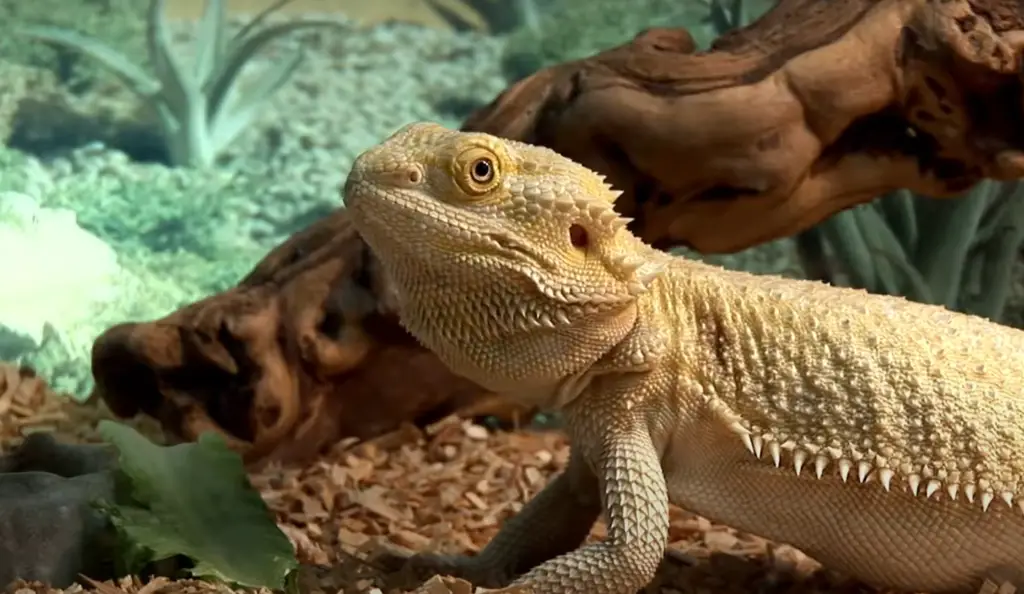
Feeding your reptile pet is not about just throwing something at them and walking away. You should take the time to prepare a balanced diet that meets their nutritional needs. Apples are an excellent and nutritious fruit that can make a terrific addition to a bearded dragon diet if done the right way. Choose the right apples, wash and slice them correctly, balance the diet, and feed consistently. If you follow these easy steps, you can ensure that your bearded dragon receives the necessary nutrients, vitamins, and minerals, and you will see a healthy and happy pet!
FAQ
Are apples safe for bearded dragons?
Bearded dragons enjoy a wide variety of fruits, including apples. Apples are a nutritionally beneficial fruit that offers a variety of vitamins and minerals to your pet. However, it’s essential to note that apples should be offered only as an occasional treat and not as a primary food source. Furthermore, bearded dragons should only consume cooked apples as uncooked apples can be challenging for them to ingest and digest.
Can Beardies drink milk?
Milk is not a food option that you should consider feeding your bearded dragon. They are lactose intolerant, and giving them milk can cause digestive problems, diarrhea and make them uncomfortable. Although milk is not safe for them, you can offer your bearded dragon water as a primary source of hydration.
What is a bearded dragon’s favorite food?
Bearded dragons are omnivores, and a well-rounded diet that comprises live insects and fresh vegetables is essential to their health. Collard greens, dandelion greens, mustard greens, and kale are leafy greens that have numerous vitamins and minerals significant to a bearded dragon’s diet. Insects like crickets, mealworms, and wax worms should be served fresh, and not as a staple because feeding beardies with just insects can be choking hazards and hard to digest. You can also offer fruits as a treat in moderation, which includes strawberries, bananas, papayas, and others.
Useful Video: Can Bearded Dragons Eat Apples? [Learn This Before Making a Major Mistake]
Conclusions
In conclusion, bearded dragons can enjoy small amounts of apples as a treat, as long as they are sliced into small pieces and fed infrequently. As with any new food, start with a small amount and gradually introduce it into their diet. Remember to always remove the seeds and skin, and rinse the apple thoroughly before feeding. Feeding your bearded dragon apples can be a fun and healthy addition to their diet, as long as it’s done in moderation.
References:
- https://dragonsdiet.com/blogs/dragon-care/the-complete-bearded-dragon-diet-plan
- https://reptile.guide/can-bearded-dragons-eat-apples/

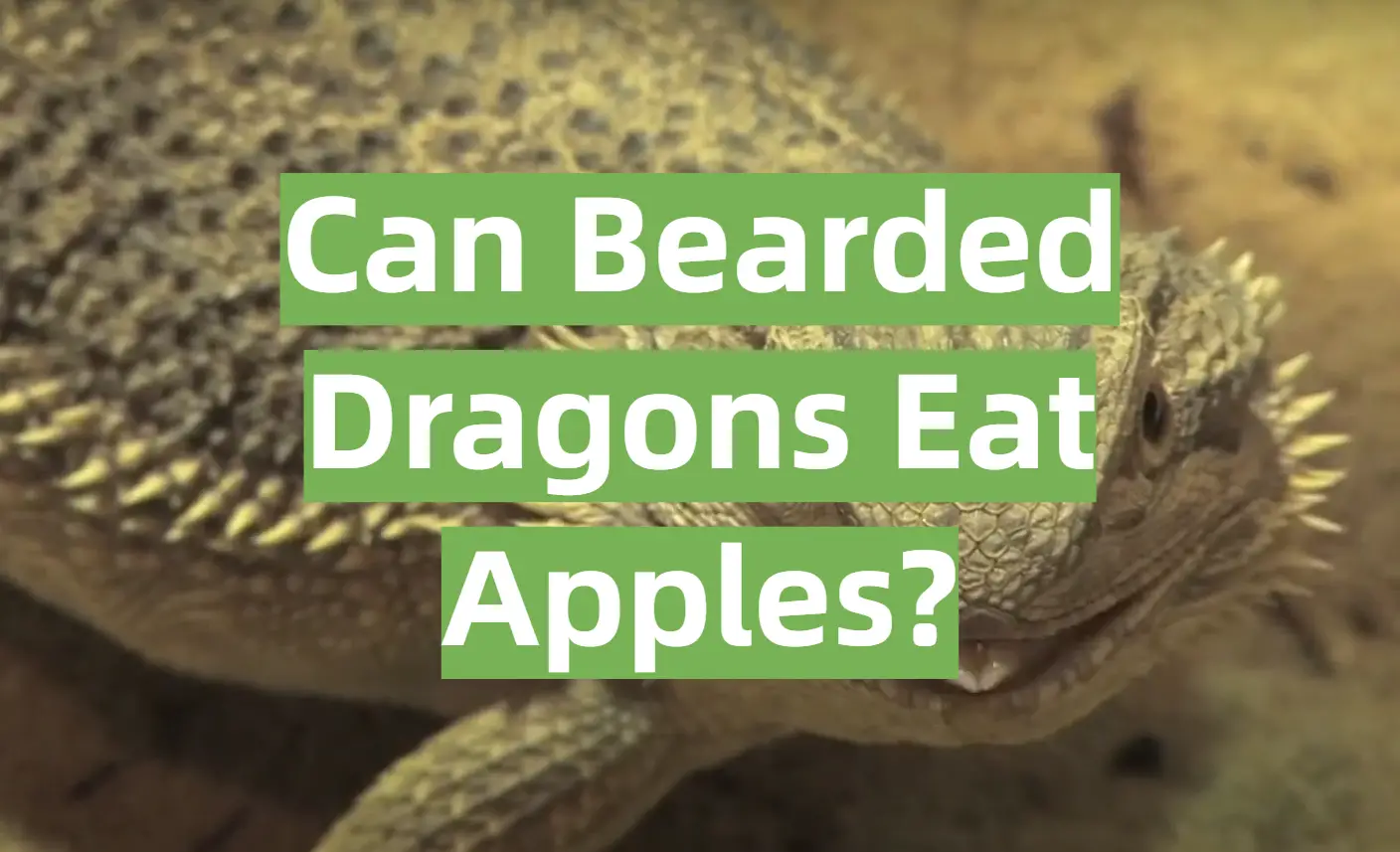



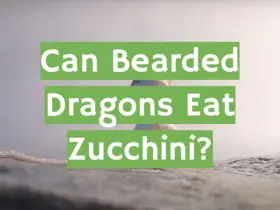
Leave a Review